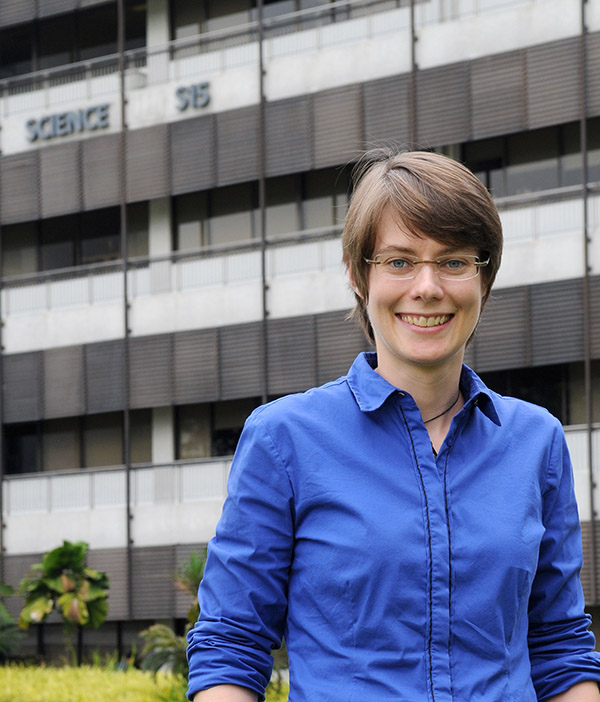Highlights
Meet a CQTian: Lana Sheridan

Lana Sheridan, a Research Fellow at CQT, is interested in randomness. She also plays 'Kendo', a martial art which involves hitting people in the head with big sticks.
Who you are and where are you from?
I'm Lana. I'm American, but I wasn't born there. I'm a 'military brat', so we moved around a lot when I was a kid. I studied at Oxford in the UK, then did a PhD in Waterloo, Canada. Then I came here. I'm 31.
Why here?
There's a big group at CQT, which has the advantage that you can work with a lot of different people and be exposed to lots of different ideas. An important factor for me was that it also accommodated the 'two body problem'. I'm married to a postdoc I met when we were both students in Waterloo. It's hard to find two jobs together. Here there were good opportunities for me and good opportunities for him to do our research.
What is your research about?
I've actually worked on a lot of different topics, but right now what's really fascinating me is randomness – certifying randomness, randomness generation, all of this. It's great because the Centre now has a big interest in this area that's supported by a new grant. There are a lot of applications for randomness. You need it to run randomized algorithms, for software testing, for gambling, and you definitely need it a lot in cryptography.
What does randomness have to do with quantum technologies?
In physics prior to quantum mechanics – let's travel back in time to 1860 – randomness was just things you couldn't predict, but there was no fundamental reason to believe that you couldn't predict everything if you had enough detailed information. Quantum theory is different in the sense that it really only makes these statistical predictions. So, if you think that quantum theory is really valid, there are some states and some measurements where you just cannot predict the outcome. I'm working on the Bell-test certified randomness – suffice it to say, even if you don't think quantum mechanics is correct but you believe there should be no faster-than-light signalling, there are tests you can do where the outcomes have to be random or you would signal. This is true as long as we don't believe in full determinism. If there is anything we as human beings can't predict perfectly, then we can't predict these outcomes.
At the moment I'm trying to come up with a randomness amplification protocol that doesn't need to make too many starting assumptions about your source of randomness. Maybe you have a huge source of input bits you feed into this protocol and you only get out one bit from the end, but you want to show that it's more random than what you put in.
What are the highs and lows of the work?
I really enjoy the feeling when I really understand something and I can write it up in a way that I think is clear and other people will also understand. The flipside of that is that I'm very frustrated when I'm looking at papers, or having to review papers, that aren't so clear.
But you have a way to rid yourself of frustration...

Lana (on right) practices the martial art known as Kendo.
I really enjoy playing Kendo. It's a Japanese martial art. You have bamboo sticks and you hit other people in the head, and that's more or less how it works. You wear a bunch of heavy protective stuff, so it's not like it's painful. But if you want to play well you really have to have a complete single-minded focus and that's awesome for clearing your mind. If you are worried about anything, you have to put it out of your head because you are about to be hit in the head! The skill level here in Singapore is very high because there are a lot of Japanese expatriates.
At the moment I'm enjoying doing extra practices because the local teams are training for the ASEAN Kendo Tournament. I've told a lot of people about Kendo, but the interest doesn't seem to spread. You have to not mind sweating and being hit. It's not for everyone!
What else do you enjoy in Singapore?
I love the eating culture. I love that food is a priority. That is something I can really get on with. One of the cool things about living here is that I'm learning a whole bunch of new recipes and ideas for how to make things. I go out and try the hawker food and then come home and try to make it. I can do a good beef rendang – you really have to cook it for four hours – but I still can't make mee goreng like hawker mee goreng.






